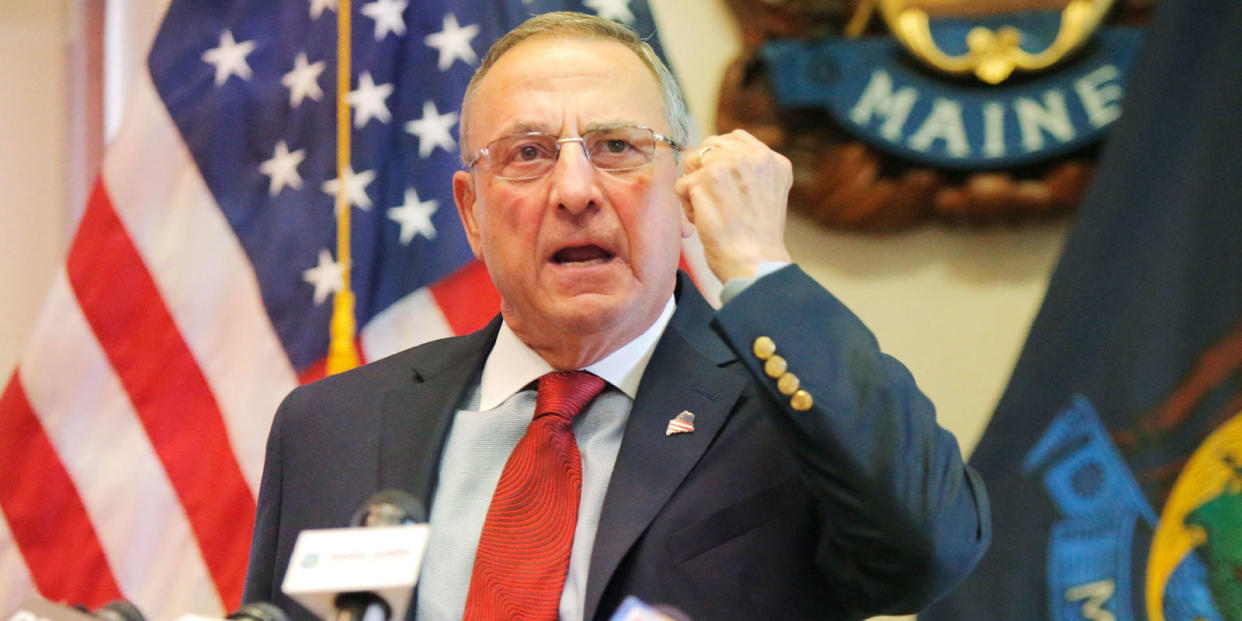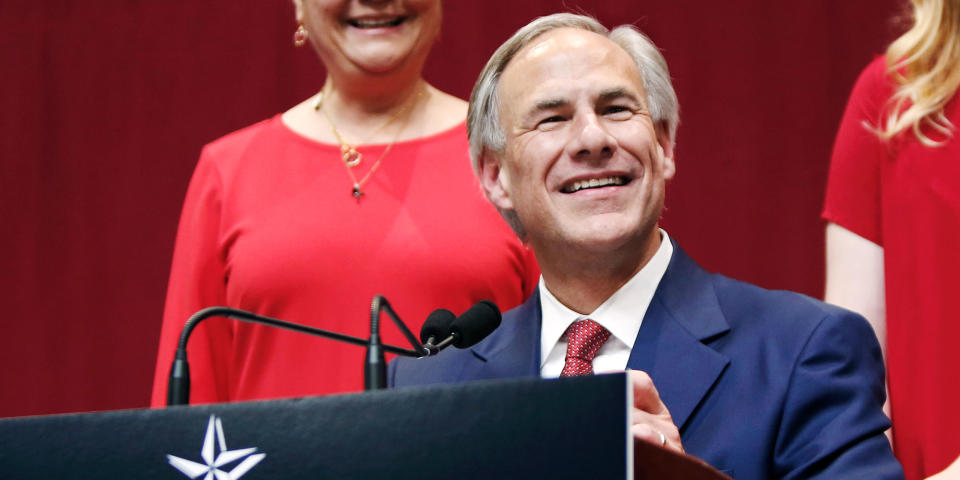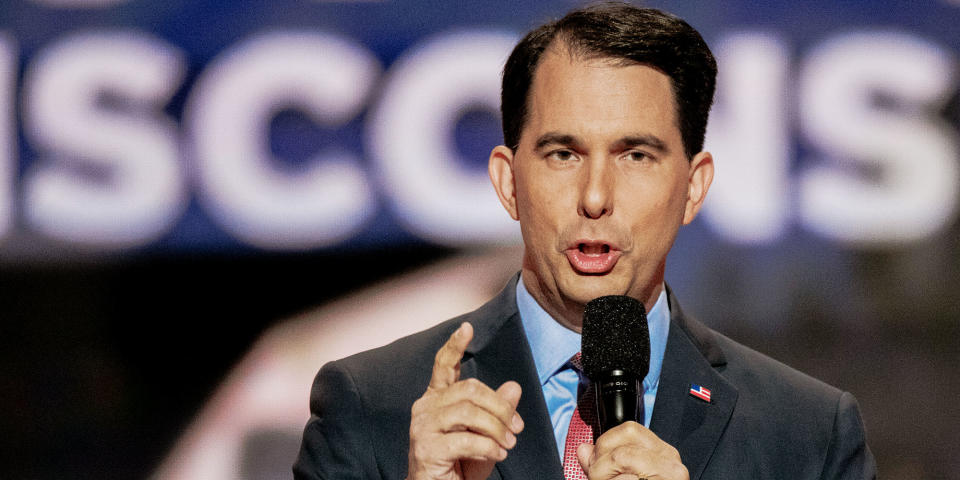Human Bowling Jacket Paul LePage Equates Confederate Statues with 9/11 Monuments

(Permanent Musical Accompaniment To This Post)
Being our semi-regular weekly survey of what's goin' down in the several states where, as we know, the real work of governmentin' gets done and where now is the time for your tears.
Let's begin with a sincere tribute.
(No! Stop him! Aieeeeee!)
The Texas state legislature has wrapped up the special session called by Governor Greg Abbott for the purpose of lighting the 20th century on fire and dancing on its ashes. That Abbott was unable to complete this task is largely due to the efforts of Joe Straus, the Republican speaker of the Texas House of Representatives. As the Dallas Morning News explains, Straus is a Republican who actually believes all that balloon juice about bipartisanship. In 2009, he was elected by a coalition of Republicans and Democrats. Now, he's pretty much the target of the local Freedom Caucus crazoids and the Bible-banging caucus, too. Abbott himself is pinning the failure of his retrograde proposals on Straus.

Criticism of Straus has intensified this week. In a radio interview Wednesday, Gov. Greg Abbott blamed Straus for the death of about half of the agenda items he put before the GOP-dominated Legislature in the just-concluded special session. Lt. Gov. Dan Patrick again lashed out at Straus late Tuesday, after the Legislature deadlocked on his top two priorities for the special session - a bathroom bill and property tax limitations. He even offered a road map for purging Straus allies in next March's GOP primaries - by looking at a key amendment vote last week on the property tax bill, as well as which members put their names on the bathroom bill in the regular session but would not do so again in the special.
Patrick, it should be noted, is nuttier than Abbott, who is nuttier than a squirrel in autumn. The Texas Tribune has further details.
Straus' situation was not just the talk of Republicans on Wednesday morning. He was repeatedly mentioned at a nearby Capitol rally featuring Democratic lawmakers, where U.S. Rep. Joaquin Castro of San Antonio, a former member of the Texas House, spoke of a "very ugly internal fight" in the Texas GOP and accused Abbott and Patrick of seeking to "cannibalize" Straus. As for the speaker's future, Democrats suggested they were watching the GOP caucus deliberations with interest. "The jury's out," state Rep. César Blanco of El Paso said, "and we'll see what Republicans decide." Straus has easily survived various challenges since he rose to power in 2009. The last time the GOP caucus chose to collectively nominate a speaker candidate - in 2011 - Straus prevailed with the support of an overwhelming majority of members.
I'm sure that Straus has positions on many issues that would make me gag. But, dammit, he was a Republican willing to stand up to the wingiest wingnuts in his own caucus and, by doing so, he did Texas the great favor of not allowing it to be turned into the newly insane state of North Carolina. I have to admit-if the Texas Democrats can't turn the state house in the next election, I'm hoping Joe Straus stays speaker. Meanwhile, Meanwhile, ni shagu nazad, says Greg Abbott. God above, the persistence of the Crazy is something to see.
Let's skip north and see if the Wisconsin state legislature has managed to cobble a budget together yet. What say you, Milwaukee Journal-Sentinel?
Guess not.
In sounding the note of caution, Fitzgerald said he hoped to restart work the week of Aug. 21 on the budget, which is now a month and a half late. The GOP senator said he has heard from other Midwest leaders that they aren't seeing as much growth in tax revenue as expected in their states.
Rep. Gordon Hintz (D-Oshkosh), another member of the budget committee, agreed on the need to be cautious but said he was skeptical Republicans would do enough to make that happen. Hintz noted that under Walker's bill the state would wrap up its two-year budget in June 2019 with $87 million in its main account. That would be a lot of money for a city or school district, but it would not enough to fund the state's large operations for two full days. "That was one of the first things we highlighted about the bill," Hintz said.
Of course, Governor Scott Walker, the goggle-eyed homunculus hired by Koch Industries to manage this particular Midwest subsidiary, has been assuring people that the state's public schools will open on schedule even if the state budget is not passed, which it won't be, because the state's unified Republican state government has been doing a gavotte on its own dick for two months.
The leaders of the state Senate have said lawmakers on the state's budget-writing committee could resume work on the budget Aug. 23. But if a budget is not in place eight days later, schools in rural areas will miss state payments they usually get in September to subsidize school operations, according to a memo from the Department of Public Instruction sent to budget-writing committee members this month. "(The delay) may cause some districts to have to short-term borrow to cover this deficit," said Kim Kaukl, executive director of the Wisconsin Rural Schools Alliance. "The majority of our districts are already working with very tight budgets and any aid delay in payments can have a serious impact." DPI spokesman Tom McCarthy said the department could push back the rural school payment deadline if lawmakers gave DPI a "clear signal" that the budget was going to be passed quickly.

The situation was bad enough, but then Walker-with the president*'s encouragement-started spooning with FoxConn, a Taiwanese tech manufacturer to which Walker has agreed to sublet a huge portion of the southeastern part of the state. Once the legislature got a look and all the devils that are gamboling through the details of the deal, somebody threw the emergency braking system and the whole legislature screeched to a halt. Walker called a special session just to deal with the Foxconn proposal. The Republicans have put together a bill offering FoxConn $3 billion in incentives to build the massive facility. The Democrats are (vainly) trying to slow the locomotive down, pleading that the state at least make a pass at judging the environmental impact of the project, and that the state at least glance at the fact that estimates say Wisconsin won't break even on this deal for 25 years. Whatever happens, however, has to happen before they get back to fighting over the budget again. I do not believe this is the way to run a state.
Meanwhile, if you were hoping that this whole Confederate statue thing wouldn't disappear before Paul LePage, the human bowling jacket who is governor of Maine, had a chance to weigh in, your prayers have been answered. The exhausted LePage chroniclers of the Portland Press-Herald have the story.
LePage, speaking to WGAN radio hosts Matt Gagnon and Ken Altshuler during his weekly call-in appearance, said he has long been outspoken in his condemnation of the KKK. He made reference to a rally by the white supremacist group in Maine in 1922. LePage said those supporting the removal of the Lee statute, "don't even know the history of this country and they are trying to take monuments down… Whether we like it or not this is what our history is and to me it's just like going to New York City right now and taking down the monument of those who perished in 9/11," LePage said. "It will come to that."
Well, when you come right down to it, Lee killed a helluva lot more Americans than Osama bin Laden ever did.
And we conclude, as is our custom in the great state of Oklahoma, where Blog Official Faultline Indicator Friedman of the Plains has yet another very special special session to tell us about. From the Tulsa World:
The Oklahoma Supreme Court determined that lawmakers failed to follow the law in passing the measure, Senate Bill 845, and struck it down as unconstitutional. Tobacco companies were among those who challenged the $1.50-a-pack fee as an unconstitutional tax. The smoking cessation fee would have generated about $215 million for the fiscal year 2018 budget, which began July 1. The court's action leaves the state short on projected revenue with no way to supplement the affected agencies without a special session. "No money can be spent from any state fund unless the Legislature specifically appropriates it," Fallin said. Office of Management and Enterprise Services Director Preston Doerflinger does not have the authority to transfer monies to the affected agencies from different sources without legislation directing him to do so, Fallin said.
Nobody, you know, thought this might be possible? And there's more!
Two other lawsuits challenging revenue-raising measures are pending before the state Supreme Court. Both challenge a 1.25 percent sales tax added to the purchase of vehicles by eliminating an exemption. Fallin said Wednesday in Tulsa that no special session will be called until the court rules on those lawsuits.
Again, there has to be a better way to do this governmentin' thing.
House Minority Leader Scott Inman, D-Del City, agreed a special session is needed. "We agree special session is absolutely necessary in order to find recurring and constitutional revenue to help balance the budget and avoid devastating cuts to core services in Oklahoma," he said. "Likewise, we agree the OMES director doesn't have the authority to move money around willy-nilly like House Republicans would like him to do."
This is your democracy, America. Cherish it.
Respond to this post on the Esquire Politics Facebook page.
You Might Also Like

